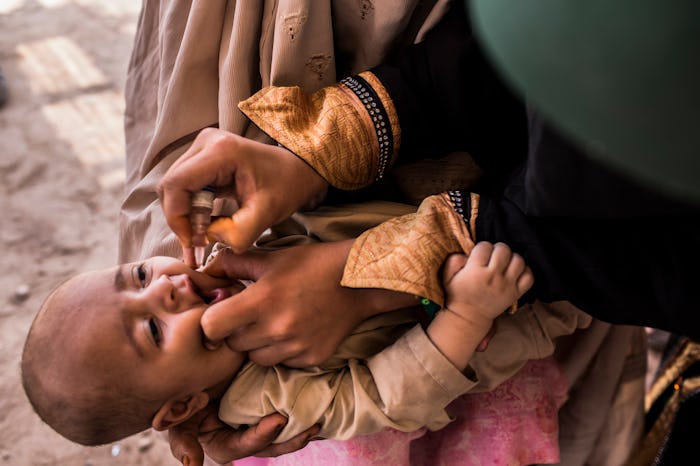Life

Why Polio Vaccinations Are More Important Than Ever
This month, the World Health Organization confirmed some scary news: In Syria and the Democratic Republic of the Congo, several recent outbreaks of polio have left multiple children paralyzed. Only six of this year's polio cases have come from naturally occurring "wild" polio — the virus as it's found in the environment — while worryingly enough, another 21 cases have been instances of vaccine-derived polio. For those who trust in the life-saving qualities of vaccines, the idea of a vaccine-derived disease can sound terrifying, but there's several reasons why the recent reports about the polio vaccine shouldn't stop you from getting your kids their shots.
To be clear, vaccine-derived polio isn't polio that infects recipients of the vaccine. Rather, it's an interesting — and tragic — case that can develop at the crossroads of oral polio vaccine use and poor sanitation in developing countries.
In most developed countries, including the United States, children are vaccinated with the injectable polio vaccine, which is created without any live forms of the virus. However, in developing countries, the oral polio vaccine is usually used instead, due to its low cost (through UNICEF, countries can get the OPV for as little as 12 cents) and ease of application (no doctors or sterile needles necessary).
However, the oral polio vaccine — unlike the injectable version — uses a live, weakened form of the virus for immunization, and for several weeks after vaccination, the virus replicates inside children's intestines and is excreted. In areas with poor sanitation, that virus can then infect un-vaccinated children and begin to spread and mutate, according to the Global Polio Eradication Initiative.
"As the virus starts circulating in the community, it acquires further mutations that make it basically indistinguishable from the wild-type virus," Raul Andino, a professor of microbiology at the University of California, told NPR recently. "It's polio in terms of virulence and in terms of how the virus spreads."
The important thing to stress, however, is the following: Vaccine-derived polio is a side effect of having too many unvaccinated people in an area with poor sanitation, rather than a result of vaccinating children. The polio vaccine will protect kids from both kinds of polio: both wild and vaccine-derived.
The solution? According to Stat, the World Health Organization and other groups are putting together an initiative to vaccinate as many children as possible as quickly as possible in key areas. "We want to really interrupt the transmission, protect the population and ensure that we don’t seed more of these … [outbreaks]," Michel Zaffran, head of the WHO polio program, told the outlet. "So it’s going to be important to do it very properly."
In areas like Syria, where conflict and lack of facilities can be a widespread problem, a coordinated effort like that is going to be difficult, but it's the kind of response outbreaks like this call for. To help in the fight to eliminate polio globally, consider donating to non-profit organizations and campaigns like the Global Polio Eradication Initiative or End Polio Now — then make sure to spread accurate information about the importance of vaccination.